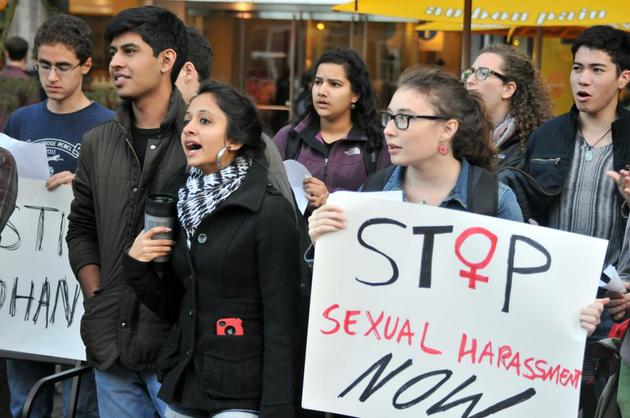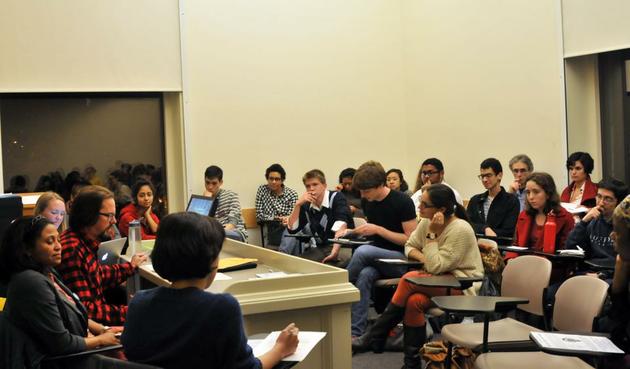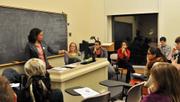Pressure, Panic and Layoffs in University Financial Services
By Geoff Carens
Pedestrians strolling by Harvard’s impressive buildings might assume that the employees within, especially those fortunate enough to belong to a union, enjoy enviable working conditions. But in one Harvard workplace, University Financial Services (UFS), union members have endured six harrowing months of unrelenting pressure to work faster or risk being laid off. On September 24, UFS managers announced their intention to terminate three employees deemed “not fast enough.” Union members who have young children and elderly dependents face the unemployment line, wondering how they will get by in the months ahead.
In March, Human Resources Officer Michelle Roach told members of the Harvard Union of Clerical and Technical Workers (HUCTW) in UFS that their jobs were being “expanded.” Roach wrote, “The next six months will be considered a transition period… your continuation in this role…is contingent upon your work performance and skills development meeting the needs of your expanded role.” Employees were offered no choice; they had to accept this precarious situation in order to keep their jobs. While a few workers received small salary increases, other staff received no compensation for their increased responsibilities and extra work.
After Roach’s announcement, David Casavant, Manager of Accounts Payable Operations, began calculating average rates for invoice processing by union members. Eventually everyone was under pressure to work at or above the average rate at least 75% of the time. Of course, unless all of the workers processed invoices at exactly the same speed, this benchmark is mathematically impossible for an entire group to achieve. Workers understood that if they did not out-perform their colleagues, they could be fired.
This production pressure was accompanied by other changes. For instance, supervisors began attributing mistakes to the current workweek regardless of when the tasks involved were actually performed. One worker told me she was taken to task, many months later, for 12 or 13 so-called mistakes she had supposedly made back in December 2011, when she was still being trained. At the same time, managers suggested to employees that they would lose their jobs if they did not perform flawlessly. Casavant sent the same message to multiple employees: “…Your error rate [of two or fewer mistakes out of hundreds or thousands of data entries per week] is not acceptable…your progress to date in this area puts you at risk of not succeeding during this transition period.” Management told the UFS staff that their jobs could be outsourced, and then implausibly added that this was not a threat.
Despite their insistence on flawless performance, managers ignored repeated requests for relevant training. Instead, workers say they were sent to classes that “had nothing to do with our jobs.” For instance, an African-American employee, whose first language is English, was told to take a pronunciation class meant for workers who grew up speaking another language, and who lack fluency in English. Incredulous but not wanting to give management any excuse to terminate her, she signed up. Her teacher wrote, “When I assessed you there was very little evidence of any problems with your speech…the fact that you spoke so clearly when we met indicates that you have all the skills you need…I don’t think it makes sense for you to attend the Pronunciation class.” Despite these comments, in a meeting on September 17, various managers claimed they had trouble understanding the employee, who told me that she understandably feels “insulted.”
The pressure to work ever faster without mistakes has negatively impacted employees’ health. One worker had a panic attack at work and left in an ambulance. Another had to take a stress-related disability leave. A third employee, skilled and dependable with 24 years of service, attributes her need to resume taking high blood pressure medication to unending exhortations to speed up at work. The medication compelled her to use the restroom more than other workers; fearful that she would be perceived as lagging, she asked to document the reason for her restroom breaks, but was not allowed to do so. Now she too has taken has taken disability leave.
In a meeting that I attended as a union rep on September 24, Casavant and HR Rep Nicole Breen announced their plan to lay off three of the workers in UFS. All three are over 40 and people of color, and two are African-American women. Breen admitted that there was no reason to terminate anyone due to lack of work in the department, acknowledging “a unique situation [in] that you eliminate jobs without the work going away.” On September 25, Casavant emailed staff in the unit to announce that three temporary workers – not entitled to union wages, benefits, or protections – would be starting the next day, replacing the workers who were no longer in the office. Reportedly these temporary employees have already called in sick several times in their first weeks on the job, and staff who remain are overloaded with work without their experienced colleagues to assist them.
All the pressure, threats of layoff, health consequences for the workers, and now job losses appear to have been completely unnecessary. The UFS work group historically met or beat every deadline, and employees in UFS were routinely pulled off their regular jobs to assist other departments. As Massachusetts’ fifth-largest employer and Cambridge’s largest, Harvard helps set regional employment standards. Concerned community members, pro-labor students, and activists in my union are determined to push for justice for those who face the loss of their jobs. We know their treatment threatens a destructive ripple effect far beyond the walls of University Financial Services.
Geoff Carens is a Union Representative in the Harvard Union of Clerical and Technical Workers and a member of the Industrial Workers of the World. A Library Assistant in Lamont Library, he attends the Harvard Extension School.
Pedestrians strolling by Harvard’s impressive buildings might assume that the employees within, especially those fortunate enough to belong to a union, enjoy enviable working conditions. But in one Harvard workplace, University Financial Services (UFS), union members have endured six harrowing months of unrelenting pressure to work faster or risk being laid off. On September 24, UFS managers announced their intention to terminate three employees deemed “not fast enough.” Union members who have young children and elderly dependents face the unemployment line, wondering how they will get by in the months ahead.
In March, Human Resources Officer Michelle Roach told members of the Harvard Union of Clerical and Technical Workers (HUCTW) in UFS that their jobs were being “expanded.” Roach wrote, “The next six months will be considered a transition period… your continuation in this role…is contingent upon your work performance and skills development meeting the needs of your expanded role.” Employees were offered no choice; they had to accept this precarious situation in order to keep their jobs. While a few workers received small salary increases, other staff received no compensation for their increased responsibilities and extra work.
After Roach’s announcement, David Casavant, Manager of Accounts Payable Operations, began calculating average rates for invoice processing by union members. Eventually everyone was under pressure to work at or above the average rate at least 75% of the time. Of course, unless all of the workers processed invoices at exactly the same speed, this benchmark is mathematically impossible for an entire group to achieve. Workers understood that if they did not out-perform their colleagues, they could be fired.
This production pressure was accompanied by other changes. For instance, supervisors began attributing mistakes to the current workweek regardless of when the tasks involved were actually performed. One worker told me she was taken to task, many months later, for 12 or 13 so-called mistakes she had supposedly made back in December 2011, when she was still being trained. At the same time, managers suggested to employees that they would lose their jobs if they did not perform flawlessly. Casavant sent the same message to multiple employees: “…Your error rate [of two or fewer mistakes out of hundreds or thousands of data entries per week] is not acceptable…your progress to date in this area puts you at risk of not succeeding during this transition period.” Management told the UFS staff that their jobs could be outsourced, and then implausibly added that this was not a threat.
Despite their insistence on flawless performance, managers ignored repeated requests for relevant training. Instead, workers say they were sent to classes that “had nothing to do with our jobs.” For instance, an African-American employee, whose first language is English, was told to take a pronunciation class meant for workers who grew up speaking another language, and who lack fluency in English. Incredulous but not wanting to give management any excuse to terminate her, she signed up. Her teacher wrote, “When I assessed you there was very little evidence of any problems with your speech…the fact that you spoke so clearly when we met indicates that you have all the skills you need…I don’t think it makes sense for you to attend the Pronunciation class.” Despite these comments, in a meeting on September 17, various managers claimed they had trouble understanding the employee, who told me that she understandably feels “insulted.”
The pressure to work ever faster without mistakes has negatively impacted employees’ health. One worker had a panic attack at work and left in an ambulance. Another had to take a stress-related disability leave. A third employee, skilled and dependable with 24 years of service, attributes her need to resume taking high blood pressure medication to unending exhortations to speed up at work. The medication compelled her to use the restroom more than other workers; fearful that she would be perceived as lagging, she asked to document the reason for her restroom breaks, but was not allowed to do so. Now she too has taken has taken disability leave.
In a meeting that I attended as a union rep on September 24, Casavant and HR Rep Nicole Breen announced their plan to lay off three of the workers in UFS. All three are over 40 and people of color, and two are African-American women. Breen admitted that there was no reason to terminate anyone due to lack of work in the department, acknowledging “a unique situation [in] that you eliminate jobs without the work going away.” On September 25, Casavant emailed staff in the unit to announce that three temporary workers – not entitled to union wages, benefits, or protections – would be starting the next day, replacing the workers who were no longer in the office. Reportedly these temporary employees have already called in sick several times in their first weeks on the job, and staff who remain are overloaded with work without their experienced colleagues to assist them.
All the pressure, threats of layoff, health consequences for the workers, and now job losses appear to have been completely unnecessary. The UFS work group historically met or beat every deadline, and employees in UFS were routinely pulled off their regular jobs to assist other departments. As Massachusetts’ fifth-largest employer and Cambridge’s largest, Harvard helps set regional employment standards. Concerned community members, pro-labor students, and activists in my union are determined to push for justice for those who face the loss of their jobs. We know their treatment threatens a destructive ripple effect far beyond the walls of University Financial Services.
Geoff Carens is a Union Representative in the Harvard Union of Clerical and Technical Workers and a member of the Industrial Workers of the World. A Library Assistant in Lamont Library, he attends the Harvard Extension School.


